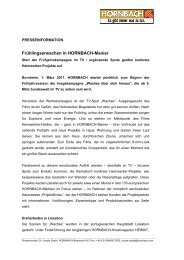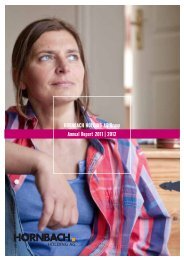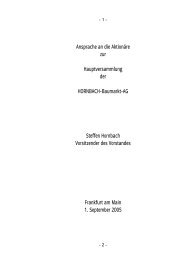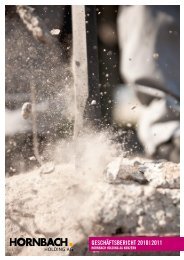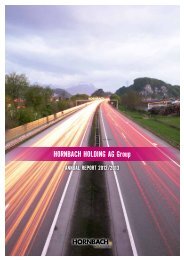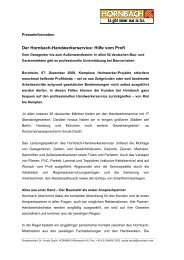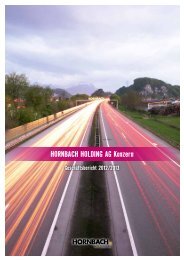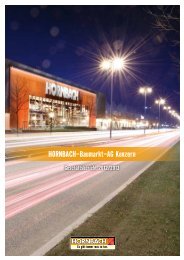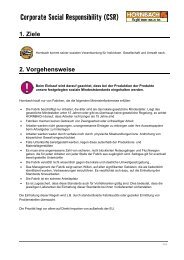Hornbach-Baumarkt-AG Group
PDF, 3,6 MB - Hornbach Holding AG
PDF, 3,6 MB - Hornbach Holding AG
- No tags were found...
You also want an ePaper? Increase the reach of your titles
YUMPU automatically turns print PDFs into web optimized ePapers that Google loves.
GROUP MAN<strong>AG</strong>EMENT REPORT Corporate Responsibility 63<br />
independent institutes, such as the Sentinel-Haus Institut in<br />
Freiburg and the eco-Institut in Cologne, and subsequently<br />
awarded the "Healthy Living" seal of approval. These products<br />
stand for less polluted ambient air and permanently better<br />
quality of living. The seal of approval means that the products<br />
tested for contaminants can easily be found at the stores. A<br />
separate website on the topic provides detailed information<br />
and answers to frequently asked questions. We will be continually<br />
expanding our range of "Healthy Living" products in<br />
the coming years.<br />
Comprehensive waste concept with customer service<br />
Given the increasing scarcity of resources, a commitment to<br />
the environment in today's world would be unthinkable without<br />
recycling. To minimize the number of journeys required,<br />
HORNBACH’s stores use compressors for high-volume waste,<br />
such as paper and plastics. A comprehensive waste concept<br />
promotes the separation, and thus recycling, of recyclable<br />
fractions as secondary commodities, while also helping to<br />
reduce the volume of non-recyclable waste.<br />
Since the 2012/2013 financial year, customers in Germany<br />
have had the opportunity of depositing broken energy-saving<br />
light bulbs, LEDs, and luminescent tubes free of charge in<br />
suitable containers at the stores. With this voluntary service,<br />
HORNBACH will make it easier for consumers to dispose of<br />
these items in future during its usual opening hours, which<br />
are significantly more generous than those at municipal<br />
collection points. As a further voluntary service, the company<br />
has also enabled customers to return broken small electrical<br />
appliances, such as drills, fret saws, and battery-powered<br />
drills. The aim here is to contribute towards protecting the<br />
environment and help avoid such products being illegally<br />
disposed of in normal household waste.<br />
Logistics: fewer miles, less packaging<br />
With its logistics centers, HORNBACH is also making a sustainable<br />
contribution towards protecting the environment. In<br />
its logistics activities, the <strong>Group</strong> continued to work on<br />
reducing its CO 2 emissions in the year under report as well.<br />
Enhanced tour planning and making optimal use of available<br />
freight capacities have enabled us to reduce the number of<br />
miles traveled, and thus also our truck requirements. This has<br />
been accompanied by a reduction in the volume of emissions<br />
per loading unit. The company also checks whether the haulers<br />
have engines corresponding to the Euro 5 standard, in<br />
which the Emissions Directive governing pollutant emissions<br />
has been set out since 2009.<br />
Having said this, group logistics by no means rely solely on<br />
truck-based transport. Heavy goods, such as tiles from Italy,<br />
are transported across the Alps by rail. Containers from the<br />
import hub of Rotterdam are also returned not by truck, but by<br />
inland waterway and rail.<br />
A further field of action involves freeing the merchandise<br />
delivered from unnecessary packaging material. This is<br />
achieved, for example, by working with reusable, durable<br />
transport containers in circuits between suppliers, our stores<br />
and logistics centers.<br />
By consistently managing time slots at incoming merchandise<br />
gateways at the logistics centers, we have managed to reduce<br />
truck waiting times, thus enhancing working conditions for<br />
drivers and employees alike.<br />
Further reduction in car pool CO 2 statistics<br />
To continue to account for ecological and economic factors,<br />
the maximum CO 2 limit has been reduced from 180 to 170<br />
grams per kilometer. No vehicles with higher emissions are<br />
listed. For the vehicles ordered in the year under report, average<br />
consumption and CO 2 emissions were further reduced<br />
compared with the previous year. The average consumption of<br />
the vehicles ordered currently amounts to 4.6 liters per 100<br />
kilometers, while average CO 2 emissions amount to<br />
120.8 grams per kilometer.<br />
By accounting for fuel consumption in the calculation of the<br />
monthly mobility installment, drivers are incentivized to select<br />
lower consumption vehicles. What’s more, a first hybrid vehicle<br />
has been included in the vehicle portfolio. By introducing<br />
new Company Car Guidelines, the company is also creating



